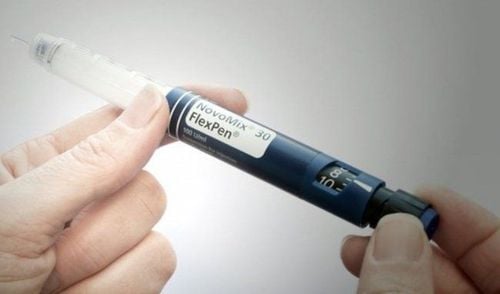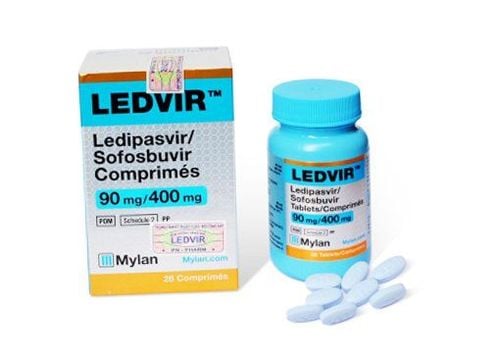This is an automatically translated article.
The drug SPLostal is known to have an effect on the blood. Currently, the information about the use of SPlostal is still not very complete and detailed. The following article would like to send readers useful information about the uses as well as notes to use this drug safely.
1. What is the effect of SPlostal?
SPlostal is used in the following cases:
Treatment of ischemic symptoms such as: ulceration of the extremities, pain and coldness of the extremities in cases of chronic arterial obstruction, typically Buerger's disease , arteriosclerosis, peripheral vascular disease due to complications of diabetes. Prevention of recurrence of cerebral infarction (except in cases of cerebral embolism due to heart). Prevention for patients after coronary artery bypass grafting or stenting to avoid thrombotic complications. Help patients effectively improve symptoms, walking distance of claudication is painless at rest and peripheral tissues show no signs of necrosis.
2. Dosage and usage of the drug SPLOstal
3.1. Dosage The dose of Splostal can be adjusted according to the patient's condition. However, it is necessary to follow the doctor's prescription or follow the dose in the instruction sheet listed in the medicine box. The usual dose of SPlostal is 100mg twice a day.
3.2. How to take Splostal is taken orally. Splostal drug has properties when taken orally depending on the meal: take at least 30 minutes away from the main meal or 2 hours after the main meal. It is not recommended to take Splostal on an empty stomach because when the concentration of cilostazol increases, it can cause many unwanted effects.
For children, the safety and effectiveness of the drug has not been determined specifically and clearly. In the treatment of lameness, an improvement in walking distance can be observed after 4 to 12 weeks of treatment and a marked improvement in effectiveness from 16 to 24 weeks of treatment. If cilostazol is not effective after 6 months, another course of treatment should be considered.
3. Contraindications when taking the drug Splostal
Do not use SPlostal in the following cases:
Patients with hypersensitivity to Cilostazol or any ingredient in the drug. The patient has severe renal failure. Patients with liver failure (moderate to severe) Women who are pregnant or able to conceive. Patients prone to bleeding: Gastrointestinal and urinary tract bleeding, intracerebral hemorrhage, capillary fragility, hemoptysis, vitreous hemorrhage. Patients with cardiovascular diseases such as: a history of ventricular tachycardia, ventricular fibrillation or prolonged QT interval, congestive heart failure.
4. Interactions of the drug SPLOstal
Caution when using Splostal with some of the following drugs:
Aspirin, Warfarin, Clopidogrel: When combining Splostal with this group of drugs, there is a risk of prolonging the bleeding time. When Splostal is combined with classes of drugs with potential to cause hypotension, there is an additive hypotension associated with increased heart rate. Cytochoromr P-450 Inhibitors: Antifungal Azole, Cimetidine, Macrolide, Diltiaze, Ritonavir may increase the plasma concentration of Cilostazol. CYP-450 substrates (Halofantrin, Simvastatin, Cisaprid, ....): There is a risk of increased serum concentrations of these substances. Inducers of CYP-450 (Carbamazepine, Phenytoin, Rifampicin...): When combined with this group may change the therapeutic effect of Cilostazol.
5. What side effects can be caused when using SPlostal?
When using Splostal, there are undesirable effects such as:
Common: Headache, dizziness, heart palpitations, arrhythmia, angina pectoris; nasopharyngitis; digestive disorders (vomiting, nausea, abdominal pain, diarrhea...); rash, itching. Uncommon: Causes anemia, hyperglycemia, risk of diabetes, sleep disturbance, myocardial infarction, congestive heart failure, gastrointestinal bleeding, non-specific bleeding, hypotension , cough, pneumonia, stomach ulcers, chills, muscle pain. Rare: Prolonged bleeding time, increased primary platelets in the blood; renal failure and acute renal failure. When experiencing side effects on the patient should notify the doctor immediately or immediately go to the nearest medical facility for guidance and timely treatment.
6. Pay attention to precautions when using Splostal
Patients should refer to some of the following notes before using SPlostal:
Closely monitor symptoms of angina because Cilostazol treatment may increase pulse rate. Caution should be exercised in patients taking anticoagulants, thrombolytics, thrombolytics, prostaglandin E1 or derivatives; the patient is menstruating; narrowing of the coronary arteries, thrombocytopenia, bleeding tendencies, diabetes or abnormal glucose tolerance; severe renal failure, severe liver failure; Severe hypertension with persistently high blood pressure. Cilostazol should not be used in patients with cerebral infarction until their condition has stabilized. Elder. Hematologic disorders including granulocytopenia, secondary thrombocytopenia, leukopenia, pancytopenia, and aplastic anemia have been reported. Most patients recover after stopping Cilostazol. If bleeding, easy bruising, etc. occur, immediately contact your doctor or pharmacist for examination and treatment. SPlostal should be discontinued immediately in the event of retinal bleeding or in the presence of any clinical or laboratory evidence of a hematological disorder. Cilostazol should be used with caution in patients with atrial or ventricular deviation, atrial flutter, atrial fibrillation. Only use cilostazol in patients who have made lifestyle changes such as a reasonable diet, exercise, and stopped smoking but still have not improved the disease. Do not use in patients with serious arrhythmias such as tachycardia, arrhythmias, unstable angina, heart attack, patients who have had coronary artery bypass surgery or patients taking anticoagulants or antiplatelet drugs such as aspirin and clopidogrel. There are no adequate data on the use of SPlostal in pregnant and lactating women. Patients should use the drug with caution and only use it in case of necessity with a prescription from a doctor or pharmacist.
Please dial HOTLINE for more information or register for an appointment HERE. Download MyVinmec app to make appointments faster and to manage your bookings easily.













